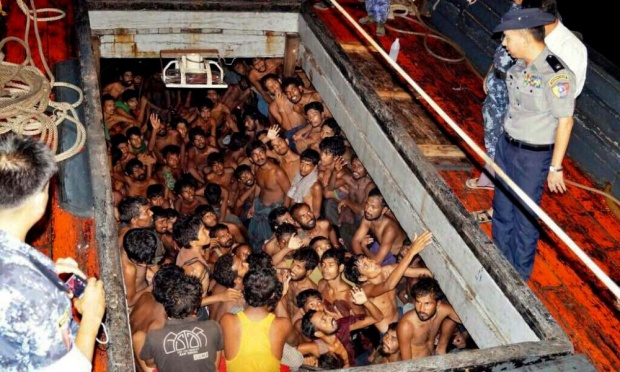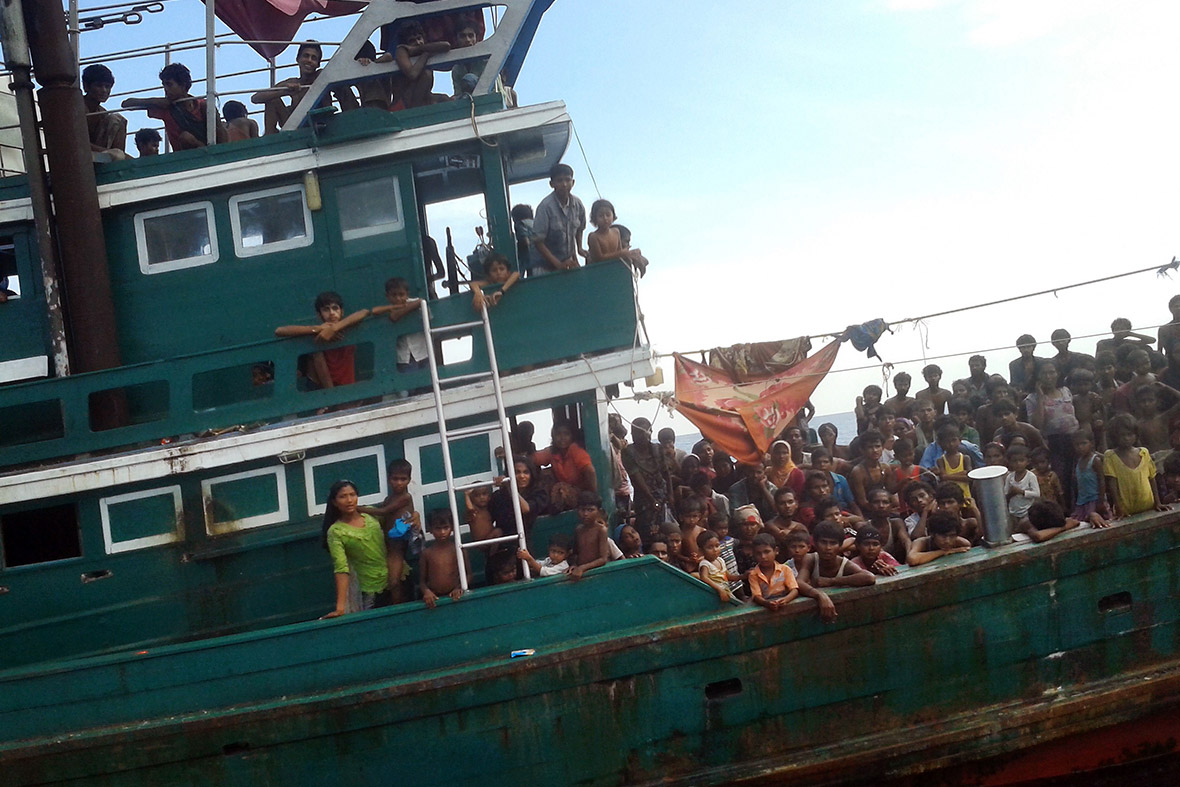Posts Tagged ‘ASEAN’ (637 found)
Fate of the Rohingya Remains Uncertain
 The UN High Commissioner for Refugees has stated there are still thousands of Rohingya and Bangladeshi refugees stranded at sea, half of whom have been confined to their boats for more than a month. Many of the refugees are facing severe food and water shortages, and rescuers from Malaysia, Thailand and Indonesia – including Sumatran fishermen who have taken it upon themselves to rescue refugees – have reported that a number of boat people are in grave condition. Meanwhile, on 24 May 2015, another mass grave containing hundreds of refugees was unearthed near one of the recently uncovered human trafficking camps in Malaysia. A number of the victims were found to be from Burma, demonstrating the desperation faced by thousands of refugees wishing to emigrate from the oppression faced back home.
The UN High Commissioner for Refugees has stated there are still thousands of Rohingya and Bangladeshi refugees stranded at sea, half of whom have been confined to their boats for more than a month. Many of the refugees are facing severe food and water shortages, and rescuers from Malaysia, Thailand and Indonesia – including Sumatran fishermen who have taken it upon themselves to rescue refugees – have reported that a number of boat people are in grave condition. Meanwhile, on 24 May 2015, another mass grave containing hundreds of refugees was unearthed near one of the recently uncovered human trafficking camps in Malaysia. A number of the victims were found to be from Burma, demonstrating the desperation faced by thousands of refugees wishing to emigrate from the oppression faced back home.
Burma’s discriminatory treatment of the Rohingya continues to fuel the refugee crisis in the Andaman Sea. Over the past weekend, President Thein Sein approved the Population Control Health Care Bill, which enshrines into law the authority for state governments to determine birth-spacing guidelines in regions that are deemed to be facing high population growth, thus potentially acting as a tool for religious and ethnic discrimination. This repressive and discriminatory bill, a component of the controversial Race & Religion Protec tion Laws, has been supported by an influential group of ultra-nationalist Buddhist monks, such as the notorious Wirathu. The group has long spearheaded the hate campaign against Burmese Muslims of which many analysts claim is politically motivated by elements within the state apparatus.
• • •Urgent APRRN Statement On Indonesia, Malaysia and Thailand Allowing Migrants Rescued at Sea Temporary Protection
APRRN welcomes the decision of the governments of Malaysia, Indonesia and Thailand to provide temporary protection to refugees and migrants rescued at sea as a step in the right direction […]
• • •ASEAN, International Community Must Prioritise Rohingya Women and Children in Crisis
The Women Peace Network – Arakan (WPN-A) urgently calls upon the international community, including ASEAN governments, to act immediately to save and protect the Rohingya women and children who are currently trapped at sea […]
• • •ASEAN Parliamentarians Welcome Temporary Shelter for Boat People, but Stress Need to Address Root Causes of Refugee Crisis
JAKARTA, 21 May 2015 – ASEAN Parliamentarians for Human Rights today welcomed the decision by Indonesia and Malaysia to provide temporary shelter to 7,000 migrants stranded at sea, but continued to demand that regional leaders address the state-sponsored persecution of Rohingya in Myanmar that lies at the root of the mass exodus […]
• • •Letter from Members of the U.S. House of Representatives to U.S. Secretary of State John Kerry on the Rohingya Refugees
Like many around the world, we are horrified by the humanitarian crisis affecting the Rohingya Muslims in Southeast Asia, where thousands of men, women, and children have been put at grave risk as they flee systematic repression in Burma […]
• • •Joint Statement By UNHCR, OHCHR, IOM And SRSG For Migration and Development: Search and Rescue At Sea, Disembarkation, and Protection of The Human Rights of Refugees and Migrants Now Imperative To Save Lives in The Bay of Bengal and Andaman Sea
We, the undersigned*, strongly urge the leaders of Indonesia, Malaysia, and Thailand, to protect migrants and refugees stranded on vessels in the Bay of Bengal and the Andaman Sea, to facilitate safe disembarkation, and to give priority to saving lives, protecting rights, and respecting human dignity […]
• • •Rohingya and Bangladeshi Boat People Humanitarian Crisis: Prompt and Concrete Measures Needed
The Malaysian Bar is appalled by the ongoing saga of the fate befalling boatloads of thousands of people heading for our shores […]
• • •Burma: Action Urged On Stranded Rohingya Refugees
Christian Solidarity Worldwide (CSW) has called on the British government to press for EU Foreign Ministers meeting today to discuss the case of Rohingya refugees who are currently stranded in the Andaman Sea […]
• • •Statement of the Coalition of Young People of Indonesia for ASEAN
Dear ASEAN Community, lately we have been surprised by the news of forced migration of Rohingya people from Myanmar […]
• • •Human Rights at the Bottom of the Andaman Sea
 Earlier this week, two boats containing 600 refugees from Burma – mainly Muslim Rohingya – were turned away from the shores of Malaysia, having fled oppression under the Burma Government. They had been at sea for over two months and faced severe dehydration, starvation, and sickness. According to the International Office for Migration, there may be up to 8,000 still stranded at sea, many of whom will perish unless the international community provides urgent and substantive support. The scale of the exodus from Burma is alarming; according to the UN, this year alone more than 25,000 refugees have left Burma and Bangladesh for the shores of Thailand, Indonesia and Malaysia.
Earlier this week, two boats containing 600 refugees from Burma – mainly Muslim Rohingya – were turned away from the shores of Malaysia, having fled oppression under the Burma Government. They had been at sea for over two months and faced severe dehydration, starvation, and sickness. According to the International Office for Migration, there may be up to 8,000 still stranded at sea, many of whom will perish unless the international community provides urgent and substantive support. The scale of the exodus from Burma is alarming; according to the UN, this year alone more than 25,000 refugees have left Burma and Bangladesh for the shores of Thailand, Indonesia and Malaysia.
Many have been identified as Rohingya, Burma’s most persecuted religious minority population. For decades, the Rohingya have been systematically denied citizenship by their oppressive, military-backed government and subjected to repressive and discriminatory legislation, widespread and systematic human rights abuses, and violence that Human Rights Watch has classified as ethnic cleansing. Since 2012, hundreds have died and more than 140,000 have been displaced from their homes and villages. At the very least, the Burma authorities have been criminally negligent as regards the Rohingya; in many cases they were reportedly complicit in the violence. The Burma Government has shown no willingness to even investigate the violence, let alone prosecute those responsible.
• • •








 All posts
All posts